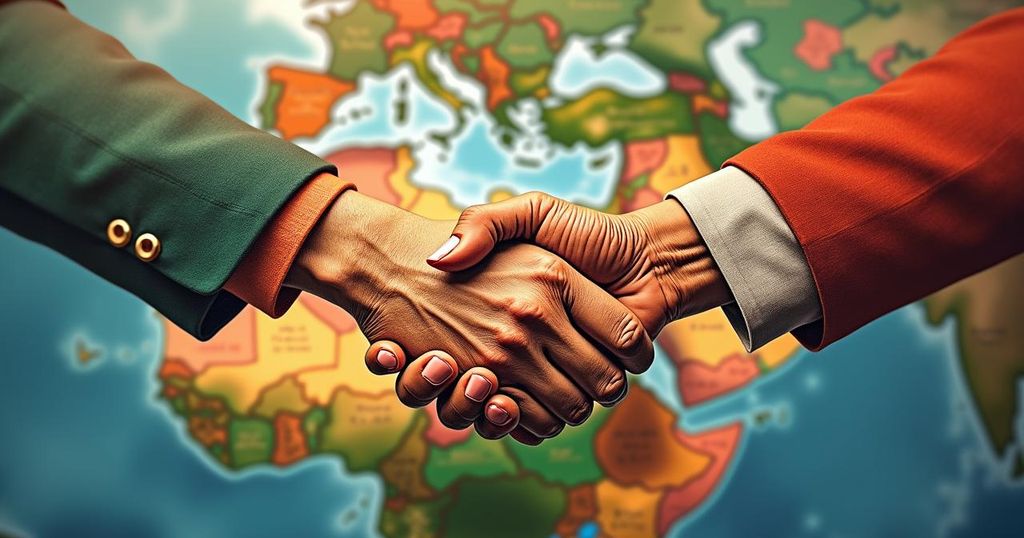Egypt, Eritrea, and Somalia Establish Alliance for Regional Security in the Horn of Africa
Egypt, Eritrea, and Somalia’s leaders have formed a new alliance to address regional security concerns, particularly in light of tensions in Sudan, Ethiopia’s maritime dealings with Somaliland, and the situation in the Red Sea. At their first summit in Asmara, they pledged to enhance cooperation, respect sovereignty, and counter external interference, while also addressing Somalia’s internal challenges and strengthening its military capabilities against terrorism. This collaboration notably excludes Ethiopia amid rising regional rivalries.
In a significant development in the Horn of Africa, the leaders of Egypt, Eritrea, and Somalia convened for an unprecedented summit in Asmara, during which they expressed their commitment to a collaborative approach towards enhancing regional security. This meeting comes amid escalating tensions influenced by the ongoing conflict in Sudan, a contentious maritime agreement between Ethiopia and the declared independent region of Somaliland, and security threats in the Red Sea stemming from Houthi rebel activities. The summit highlights the emergence of a new alliance within the region, notably excluding Ethiopia, which has recently experienced strained relations with Somalia over the Somaliland maritime deal. The meeting, organized by Eritrean President Isaias Afwerki, also involved Egyptian President Abdel Fattah al-Sisi and Somali President Hassan Sheikh Mohamud. Following their discussions, a statement was released by the Eritrean information ministry, emphasizing the need for mutual respect for sovereignty and territorial integrity among regional nations, although it refrained from naming any specific countries. The leaders also underscored the necessity of countering external interference in domestic matters and coordinating collective efforts towards achieving stability and sustainable development. Specifically addressing Somalia, they committed to enhancing their cooperative endeavors to assist that nation in addressing both internal and external challenges, strengthening the Somali National Federal Army’s capacity to combat terrorism, and safeguarding borders. The summit additionally encompassed dialogue on the crises affecting Sudan and the security dynamics in the Red Sea, with an agreement to establish a tripartite foreign ministers’ committee dedicated to fostering strategic cooperation across various fields. President Sisi’s visit marked a significant diplomatic gesture, as it reportedly represents the first attendance of an Egyptian president in Eritrea since the visit of Hosni Mubarak in the early 1990s, notwithstanding President Isaias’s prior visits to Egypt. In addition, President Mohamud has maintained a strong presence in Eritrea, known for its isolation. The underlying regional tensions were exacerbated following Ethiopia’s January memorandum with Somaliland to lease coastal territory for a naval base, an action that sparked vehement objections from Somalia, which continues to assert the non-recognition of Somaliland’s independence. In retaliation, Somalia formalized a military agreement with Egypt in August, and Cairo has pledged troops as part of a new African Union mission aimed at combating the Al-Shabaab militant group. Furthermore, Egypt and Ethiopia have had longstanding disputes regarding the Grand Ethiopian Renaissance Dam, concerning Egypt’s vital water security. Despite historical hostilities, particularly regarding Eritrea’s involvement in Ethiopia’s prior Tigray conflict, both Ethiopian and Eritrean officials portrayed a seemingly amicable relationship at a recent briefing. President Isaias has governed Eritrea since its independence from Ethiopia, amidst often-complex bilateral relations characterized by past conflicts and recent reconciliations. In summary, the summit in Asmara signifies a pivotal shift towards strengthened ties among Egypt, Eritrea, and Somalia, driven by mutual concerns over security, territorial integrity, and countering regional instability. The dialogue underscored the importance of collaboration in addressing both internal struggles and regional dynamics, while also reflecting the ongoing complexity of relationships within the Horn of Africa.
The Horn of Africa is a region replete with historical conflicts, geopolitical rivalries, and pressing security challenges. The recent summit in Asmara, attended by the leaders of Egypt, Eritrea, and Somalia, occurs against a backdrop of heightened instability due to the Sudanese conflict, tensions concerning Ethiopia’s agreements with Somaliland, and ongoing threats from rebel groups in the Red Sea area. In this complex environment, the three nations are seeking a united front to foster regional security and stability, with notable diplomatic maneuvering involving military agreements and partnerships, particularly following Somalia’s rejection of Somaliland’s independence. The isolationist stance of Eritrea further complicates dynamics with Ethiopia, which has oscillated between hostility and cooperation over the years, particularly influenced by past border wars and the recent peace process with the Tigray People’s Liberation Front. The summit marks an important development in redefining alliances within the Horn of Africa.
The cooperative efforts showcased at the Asmara summit herald a strategic alignment among Egypt, Eritrea, and Somalia aimed at confronting shared security challenges and fostering stability within the Horn of Africa. The commitment to uphold sovereignty, coordinate defense efforts, and stabilize the region reflects a significant shift in regional politics, particularly in light of Ethiopia’s exclusion and the broader implications of international interference. This alliance may serve as a counterbalance to Ethiopia’s growing influence in the region, while also helping Somalia tackle its enduring challenges, effectively transforming the geopolitical landscape of the Horn of Africa.
Original Source: www.modernghana.com




Post Comment